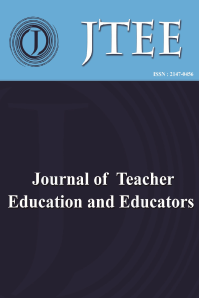Birleşik Arap Emirlikleri Başkenti Abu Dabi’de Geniş Çaplı Eğitim Re- formu: Öğretmenlik Programı Öğrencileri Neler Düşünüyor?
Abu Dabi’deki tüm devlet okulları, geniş çaplı bir eğitim reformunun bir parçası olarak, geçtiğimiz altı yıl boyunca büyük çapta gelişim göstermiştir. Bu yıllar boyunca Emirlikte devlet okullarında çalışan öğretmenlerin çalışma hayatındaki gerçeklikler oldukça değişmiştir. Bu araştırma, dört beş yıl önce Abu Dabi’de herhangi bir yükseköğretim kurumunda öğretmen eğitimi programına kaydolmuş ve yakında öğretmen olarak mezun olacak son sınıf öğrencilerinin, öğretmenlik mesleğine yönelik algılarının reformdan etkilenip etkilenmediği sorusunu sormaktadır. Bu öğrencilerin algıları, aynı kurumda birinci sınıfta yer alan öğrencilerin algılarıyla kıyaslanmıştır. Hem birinci sınıf, hem son sınıf öğrencilerinden oluşan toplamda 138 öğrenciye şu sorulara cevap aramak amacıyla anket uygulanmıştır: Abu Dabi’deki eğitim reformuyla ilgili Emirlikteki öğretmenlik programı öğrencilerinin algıları nelerdir ve bu algıların kariyer planlarına etkileri nelerdir?
Anahtar Kelimeler:
Eğitim reformu, Birleşik Arap Emirlikleri, öğretmen adayları, algılar
Wide-scale educational reform in Abu Dhabi, United Arab Emirates: What do the teacher training students think?
All government schools in Abu Dhabi, as part of widescale educational reforms undertaken in the United Arab Emirates, have undergone massive developments over the past six years. Over the course of these years, the reality of working life for Emirati teachers working in government schools has been widely altered. This research asks the question whether final year students who enrolled on a primary teacher-training program at a Higher Education Institution in Abu Dhabi four or five years ago and who will soon graduate as teachers, have had their perceptions of the profession affected by the reform. Their perceptions were compared to those of first year students in the same institution. A total of 138 students, both first and final year, were surveyed in order to answer the questions: What are the perceptions of these Emirati teacher training students about the Educational Reform in Abu Dhabi, and what are the implications of these perceptions to their graduate career plans?
___
- Abu Dhabi Economic Vision 2030. (2008). Retrieved from http://gsec.abudhabi.ae/Sites/ GSEC/Content/EN/PDF/Publications/economic-vision-2030-executive-summary- mandate2,property=pdf.pdf
- ADEC (Abu Dhabi Education Council). (2012). ADEC and ADTC sign a MoU to train and re- cruit Emirati teachers. Retrieved from http://www.adec.ac.ae/English/Pages/PressItems. aspx?PRId=520
- ADEC Presentation.(2009). Retrieved from http://www.adec.ac.ae/ADEC%20Shared%20 Documents/attachments/Public%20schools/Strategic%20Plans/P12-Summary-June- 2009-D.pdf
- ADEC New School Model Documentation. (2009). Retrieved from
- http://www.adec.ac.ae/ADEC%20Shared%20Documents/attachments/Comprehensive%20 New%20School%20Model_Website%20Version.pdf
- Ahmed, A. (2011). 1,400 teachers to lose their jobs by end of year. The National, 26 Jun 2011 http://www.thenational.ae/news/uae-news/1-400-teachers-to-lose-their-jobs-by-end-of- year
- Albon, N. (2009). Beyond the Abaya: School reform in the Middle East. Paper
- presented at Teacher education crossing borders: Cultures, contexts, communities
- and curriculum’ Annual Conference of the Australian Teacher Education Association (ATEA). Albury, 28 June – 1 July. Retrieved from:http://www.atea.edu.au/ConfPapers/2009/Refer- eed/Albon.pdf
- Bascia, N. & Hargreaves, A. (2000). The Sharp Edge of Educational Change: Teaching, Lead- ing, and the Realities of Reform. New York: Routledge.
- Brown C.P. (2012). Children of reform: the impact of high-stakes education reform on pre- service teachers. Journal of Teaching and Education. 61(5). 477-491.
- Clandinin D.J. & Connelly F.M. (1998). Stories to live by: narrative understandings of school reform, Curriculum Inquiry 28(2), 156-157.
- Crabtree, S.A. (2010). Engaging students from the united arab emirates in culturally respon- sive education, Innovations in Education and Teaching International, 47(1), 85-94.
- Davidson, C.M. (2008). From traditional to formal education in the lower Arabian Gulf, 1820-1971, History of Education, 37(5), 633-643.
- Dessler, G. (2001). Management: Leading people and organizations in the 21st century. Engel- wood Cliffs: Prentice Hall.
- DuBrin, A. J. (2004). Leadership. New York: Houghton Mifflin.
- Godwin, S. M. (2006). Globalization, education and emiratisation: A study of the united arab emirates. The Electrical Journal on Information Systems in Developing Countries, 27(1), 1-14.
- Easterby-Smith, M., Thorpe, R. & Lowe, A. (2003). Management Research: An Introduction. London: Sage.
- Kirk, D. J . (2009). Local voices, global issues: a comparative study of the perceptions student teachers hold in relation to their pre-service education in the United States of America, England, and the United Arab Emirates. A Journal of Comparative & International Edu- cation, 39(4), 569-569
- Lunenburg F.C. (2010). Forces for and resistance to organizational change, National Forum of Educational Administration and Supervision Journal, 27(4), 1-10
- Macpherson, R., Kachelhoffer, P. & El Nemr, M. (2007). The radical modernization of school and education system leadership in the united arab emirates: towards an indigenized and educative leadership. International Studies in Educational Administration. 35(1), 60-77.
- Nelson, C. (2005). UAE national women at work in the private sector: Conditions and con- straints. Centre for Labour Market Research and Information Study. The National Human Resource Development and Employment Authority. Study no. 20.
- Roueche, J., Richardson, M., Neal, P., & Roueche, S. (2008). The Creative Community College: Leading Change Through Innovation. Washington, D. C.: Community College Press.
- Newby P. (2010). Research Methods for Education. Harlow: Pearson Education
- Safadi, A. (2008). If teachers try to disrupt the education reforms, sack them. The National, September 3. Retrieved fromhttp://www.thenational.ae/thenationalconversation/com- ment/if-teachers-try-to-disrupt-the-education-reforms-sack-them
- Shaw, K.E., Badri, A.A.M.A. & Hukul, A. (1995). Management concerns in united arab emir- ates state schools. International Journal of Educational Management. 9(4), 8-13.
- Sonleitner, N. & Khelifa, M. (2005). Western-Educated faculty challenges in a Gulf classroom. Learning and Teaching in Higher Education: Gulf Perspectives, (2), 1-21. Retrieved from: http://www.zu.ac.ae/lthe/current.html.
- Teachaway Website (2013). Retrieved January 2013 retrieved from: http://www.teachaway. com/teach-abroad/teaching-public-schools-abu-dhabi/
- Thorne, C. (2011). The impact of Educational Reform on the Work of the School Principal in the United Arab Emirates. Educational Management Administration &Leadership, 39(2), 172-185.
- UAE National Bureau of Statistics. 2010. Population by Nationality. p.10.Retrieved January 2013 from: http://www.uaestatistics.gov.ae/ReportPDF/Population%20Estimates%20 2006%20-%202010.pdf
- Warnica, E. (2010). Education Development constitues Main Pillar for Human and Economic Development Strategy. Annual Education Conference. Retrieved from: http://gulfnews. com/news/gulf/uae/education/education-conference-worrying-trend-1.692959
- ISSN: 2147-0456
- Başlangıç: 2012
- Yayıncı: İlknur GÖKÇE
